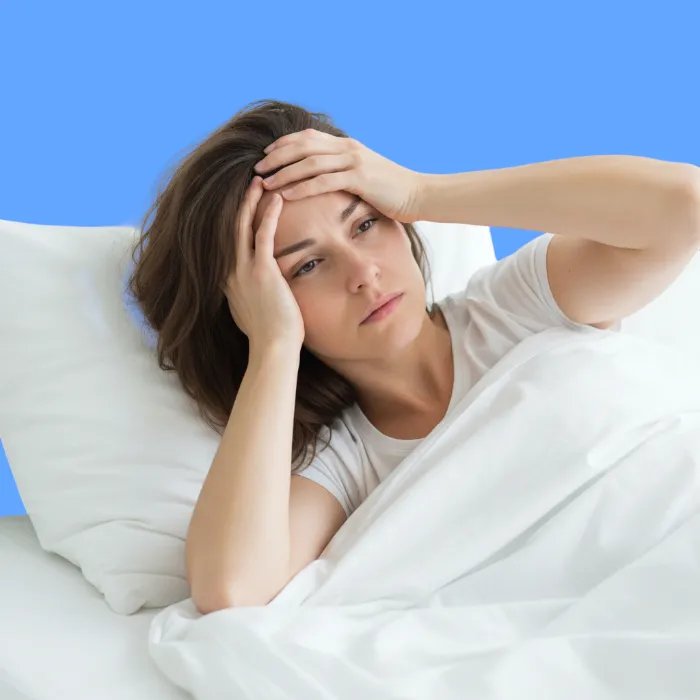what is insomnia?
Insomnia is a common sleep disorder that makes it hard for a person to fall asleep or stay asleep long enough.The person may feel mentally awake despite physical exhaustion, as if sleep escapes every time they try to reach it.
In some cases, insomnia is temporary due to life stress, while in others it becomes a chronic issue that affects daily life quality.
what are the causes of insomnia?
The causes of insomnia vary from person to person depending on lifestyle and mental health, and include:
- Constant stress and anxiety due to work or personal problems.
- Depression or other mood disorders.
- Consuming caffeine or nicotine before bedtime.
- Using electronic devices before sleep like phones or TVs.
- Disruptions in the biological clock due to travel or night shifts.
- Chronic pain or physical conditions like asthma or acid reflux.
- Taking medications that affect sleep.
- Overthinking or mental preoccupation before sleep.
what are the common symptoms of insomnia?

Insomnia symptoms appear gradually and may be noticed in daily details without directly linking them to sleep, including:
- Difficulty falling asleep despite feeling tired.
- Frequent awakenings during the night without a clear reason.
- Waking up early and being unable to return to sleep.
- Feeling tired throughout the day.
- Poor concentration and attention at work or school.
- Mood swings like irritability or sadness.
- Decreased overall performance and lack of energy.
- Mild headache or a heavy feeling in the head.
when should you see a doctor?
It is advised to see a doctor if insomnia persists or starts affecting daily life clearly. Situations that require medical attention include:
- Insomnia lasting more than two weeks without improvement.
- Negative impact on work or social relationships.
- Signs of depression or anxiety linked to insomnia.
- Dependence on sleep medications.
- Chronic illnesses affecting sleep.
- Excessive daytime sleepiness.
- Sudden changes in sleep patterns without a clear reason.
- Inability to sleep despite following prevention tips.
what are the treatment options for insomnia?
Insomnia treatment depends on its root cause and includes several options that may help improve sleep, such as:
- Cognitive Behavioral Therapy (CBT) to change negative sleep-related thoughts.
- Maintaining consistent sleep and wake times daily.
- Reducing electronic device use before bedtime.
- Practicing relaxation techniques like meditation or deep breathing.
- Avoiding caffeine and nicotine in the evening.
- Using sleep medications under medical supervision.
- Treating physical conditions linked to insomnia.
- Improving sleep environment like lighting, temperature, and quietness.
can insomnia be cured?
Yes, insomnia can be cured especially when the cause is identified and treated properly.Recovery doesn't always happen instantly, but it is possible with commitment to treatment and lifestyle changes.
The earlier the intervention, the better the chances of recovery. Some cases need psychological support or behavioral adjustment, while others improve by simply changing daily habits.
what are the prevention tips for insomnia?
Preventing insomnia starts with caring for daily lifestyle and avoiding sleep-disrupting factors. Tips include:
- Sleeping at a fixed time every day.
- Avoiding long naps during the day.
- Exercising regularly but not close to bedtime.
- Dimming the lights in the bedroom.
- Avoiding excessive thinking before sleep.
- Eating a light snack before bed if needed.
- Using the bed only for sleep, not for work or watching TV.
- Avoiding stimulants like coffee after the afternoon.
what are the possible complications of insomnia?
If left untreated, insomnia may lead to complications affecting mental and physical health, including:
- Increased risk of depression and anxiety.
- Weakened immune system.
- High blood pressure or heart problems.
- Poor professional or academic performance.
- Social relationship issues due to stress.
- Higher risk of accidents due to drowsiness.
- Appetite and weight disturbances.
- Constant fatigue and inability to enjoy life.
frequently asked questions about insomnia
Is insomnia a psychological disorder?
Not always, but it may be linked to mental health.
Can insomnia cause depression?
Yes, chronic insomnia may lead to mental disorders.
Is interrupted sleep considered insomnia?
Yes, if it affects sleep quality.
Does insomnia affect only older adults?
No, it can affect all age groups.
article summary
Insomnia is a common disorder that affects sleep and its quality. It may be temporary or chronic depending on the cause Its causes range from psychological to physical, and it can be treated through behavioral or medical approaches.
Prevention starts with lifestyle regulation, and seeing a doctor is essential if insomnia persists or impacts daily life.